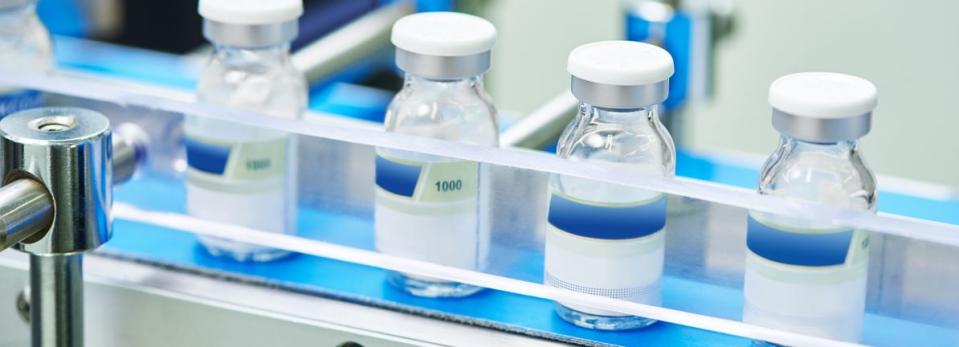Should We Worry About Sino Biopharmaceutical Limited's (HKG:1177) P/E Ratio?

Today, we'll introduce the concept of the P/E ratio for those who are learning about investing. We'll look at Sino Biopharmaceutical Limited's (HKG:1177) P/E ratio and reflect on what it tells us about the company's share price. Based on the last twelve months, Sino Biopharmaceutical's P/E ratio is 48.46. That means that at current prices, buyers pay HK$48.46 for every HK$1 in trailing yearly profits.
Check out our latest analysis for Sino Biopharmaceutical
How Do I Calculate Sino Biopharmaceutical's Price To Earnings Ratio?
The formula for price to earnings is:
Price to Earnings Ratio = Share Price (in reporting currency) ÷ Earnings per Share (EPS)
Or for Sino Biopharmaceutical:
P/E of 48.46 = CN¥10.459 ÷ CN¥0.216 (Based on the trailing twelve months to December 2019.)
(Note: the above calculation uses the share price in the reporting currency, namely CNY and the calculation results may not be precise due to rounding.)
Is A High P/E Ratio Good?
The higher the P/E ratio, the higher the price tag of a business, relative to its trailing earnings. That isn't a good or a bad thing on its own, but a high P/E means that buyers have a higher opinion of the business's prospects, relative to stocks with a lower P/E.
Does Sino Biopharmaceutical Have A Relatively High Or Low P/E For Its Industry?
We can get an indication of market expectations by looking at the P/E ratio. As you can see below, Sino Biopharmaceutical has a much higher P/E than the average company (10.6) in the pharmaceuticals industry.
That means that the market expects Sino Biopharmaceutical will outperform other companies in its industry. Clearly the market expects growth, but it isn't guaranteed. So investors should always consider the P/E ratio alongside other factors, such as whether company directors have been buying shares.
How Growth Rates Impact P/E Ratios
Generally speaking the rate of earnings growth has a profound impact on a company's P/E multiple. That's because companies that grow earnings per share quickly will rapidly increase the 'E' in the equation. And in that case, the P/E ratio itself will drop rather quickly. And as that P/E ratio drops, the company will look cheap, unless its share price increases.
Sino Biopharmaceutical shrunk earnings per share by 70% over the last year. But over the longer term (5 years) earnings per share have increased by 15%.
Don't Forget: The P/E Does Not Account For Debt or Bank Deposits
One drawback of using a P/E ratio is that it considers market capitalization, but not the balance sheet. In other words, it does not consider any debt or cash that the company may have on the balance sheet. In theory, a company can lower its future P/E ratio by using cash or debt to invest in growth.
Spending on growth might be good or bad a few years later, but the point is that the P/E ratio does not account for the option (or lack thereof).
Sino Biopharmaceutical's Balance Sheet
Since Sino Biopharmaceutical holds net cash of CN¥11b, it can spend on growth, justifying a higher P/E ratio than otherwise.
The Bottom Line On Sino Biopharmaceutical's P/E Ratio
Sino Biopharmaceutical trades on a P/E ratio of 48.5, which is multiples above its market average of 9.7. Falling earnings per share is probably keeping traditional value investors away, but the net cash position means the company has time to improve: and the high P/E suggests the market thinks it will.
Investors have an opportunity when market expectations about a stock are wrong. People often underestimate remarkable growth -- so investors can make money when fast growth is not fully appreciated. So this free report on the analyst consensus forecasts could help you make a master move on this stock.
Of course, you might find a fantastic investment by looking at a few good candidates. So take a peek at this free list of companies with modest (or no) debt, trading on a P/E below 20.
Love or hate this article? Concerned about the content? Get in touch with us directly. Alternatively, email editorial-team@simplywallst.com.
This article by Simply Wall St is general in nature. It does not constitute a recommendation to buy or sell any stock, and does not take account of your objectives, or your financial situation. We aim to bring you long-term focused analysis driven by fundamental data. Note that our analysis may not factor in the latest price-sensitive company announcements or qualitative material. Simply Wall St has no position in any stocks mentioned. Thank you for reading.

